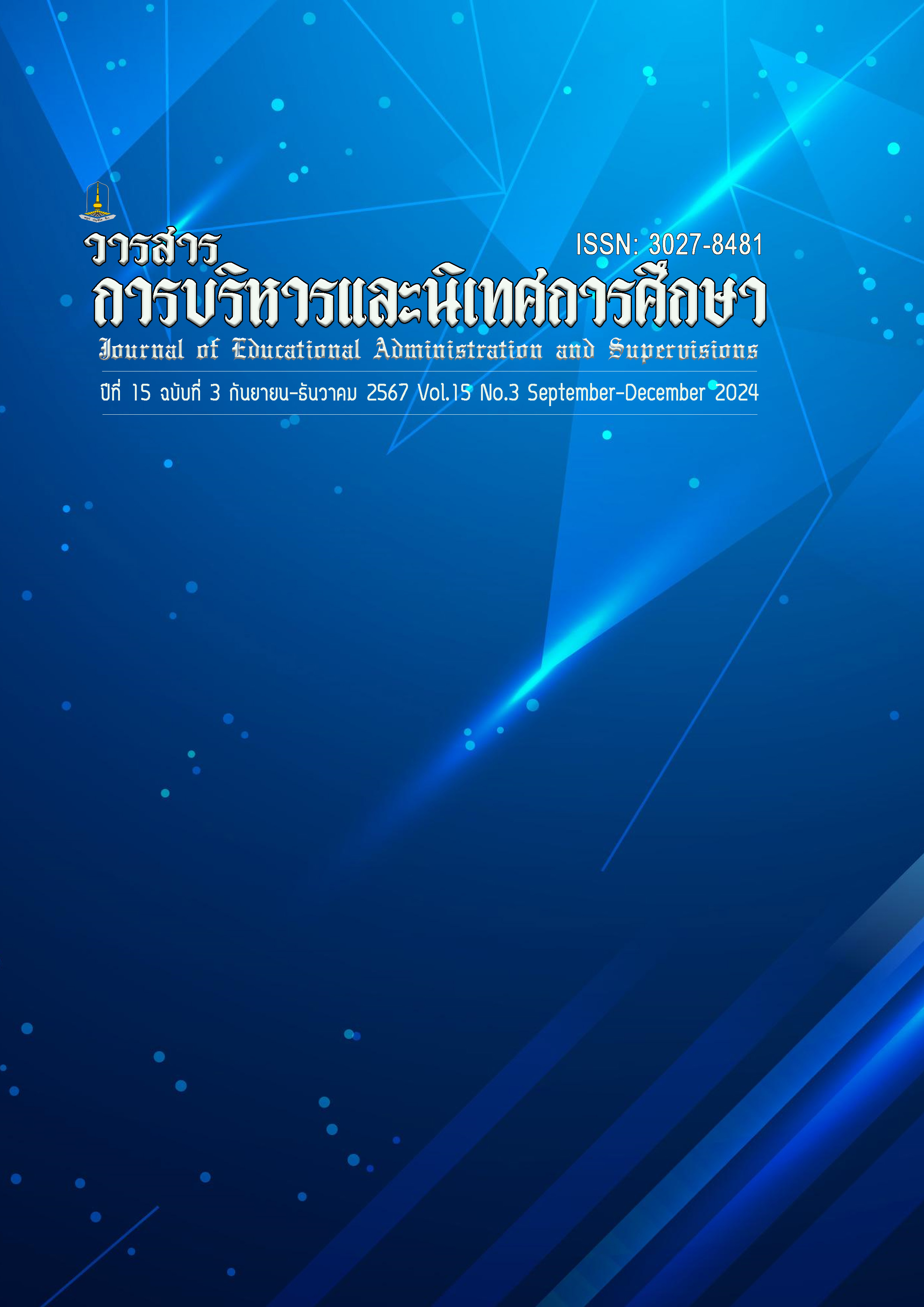Model for Developing Teacher-Researcher Competency Using Learning in the flow of work and Professional Learning Community Concepts: A Case Study of Bangli Municipality School 1 (Phanit Uthit)
Main Article Content
Abstract
This research used the research and development (R&D) model, which was divided into 4 phases: Phase 1) Needs study aimed to study the needs and guidelines for developing a model for developing the competency of researcher teachers based on the concept of on-the-job learning and professional learning communities. The informants included 40 teachers and 3 experts. The research instruments were questionnaires and interviews. Data were analyzed using mean, standard deviation, and descriptive analysis. Phase 2) Model development. The workshop informants included 3 experts, 2 administrators, and 40 teachers, totaling 45 people, and the expert seminar informants included 10 people. The research instruments were meeting minutes and a model quality check form. Data were analyzed by means of standard deviations and content analysis. Phase 3) Model trial. The target group was 40 teachers. The research instruments were a research knowledge test, a research skills assessment form, and a research attitude assessment form. Phase 4) Satisfaction assessment. The informants included 40 teachers. The research instrument was a satisfaction assessment form. Data were analyzed by means and standard deviations. The research results found that the need to develop the competence of researcher teachers is at a high level overall. The guidelines for enhancing the competence of researcher teachers include 1) setting shared values, 2) setting shared goals, 3) creating cooperation among teachers in working together, 4) jointly guiding work development, and 5) jointly discussing and reflecting on the results of the practice. The researcher teacher competence development model consists of 6 components: 1) basic theory and principles, 2) objectives, 3) systems and mechanisms, 4) methods of operation, 5) measurement and evaluation, and 6) conditions for using the model. The evaluation results from experts found that overall, it was at the highest accuracy, appropriateness, and usefulness. The results of the model trial found that after the development, teachers’ research knowledge increased by 30.17 percent, research skills increased by 29.06 percent, and attitudes toward research increased by 24.75 percent, with a statistically significant difference at the .05 level. The teachers’ satisfaction with implementing the researcher's teacher competence development model was high overall.
Downloads
Article Details
References
กุลชาติ พันธุวรกุล และเมษา นวลศรี. (2564). ความต้องการจำเป็นในการพัฒนาสมรรถนะด้านการวิจัยในชั้นเรียนของครูปฐมวัย สังกัดองค์กรปกครองส่วนท้องถิ่น จังหวัดปทุมธานี, วารสารวไลยอลงกรณ์ปริทัศน์. 11(3), 1-17. https://so06.tci-thaijo.org/index.php/var/article/view/252218
ทิศนา แขมณี. (2550). ศาสตร์การสอน (พิมพ์ครั้งที่ 2). จุฬาลงกรณ์มหาวิทยาลัย.
ธนกฤต อั้งน้อย และอนุชา กอนพ่วง. (2564). รูปแบบการพัฒนาสมรรถนะครูใหม่ในศตวรรษที่ 21 ตามแนวคิดโรงเรียนเป็นองค์กรแห่งการเรียนรู้. วารสารศึกษาศาสตร์ มหาวิทยาลัยนเรศวร, 23(2), 169-180. https://so06.tci-thaijo.org/index.php/edujournal_nu/article/download/221050
นพพร โสวรรณะ. (2564). การนำแนวคิดการเรียนรู้ในระหว่างการทำงาน (Learning in the flow of work) มาใช้ในองค์กร. สมาคมการจัดการงานบุคคลแห่งประเทศไทย. https://www.khonatwork.com/
นวลละออ แสงสุข, นารินี แสงสุข, กรเอก กาญจนาโภคิน และสวรรยา แสงสุข. (2564). วิจัยการพัฒนาสมรรถนะด้านจริยธรรมการวิจัยในมนุษย์ ของอาจารย์ประจำหลักสูตร มหาวิทยาลัยรามคำแหง. วารสารสมาคมนักวิจัย, 26(1), 268-276. http://www.ar.or.th/ImageData/Magazine/40053/DL_30507.pdf?t=637638494492254116.
พรศักดิ์ สุจริตรักษ์ และชนิตา พิลาไชย. (2564). รูปแบบการพัฒนาสมรรถนะครูรองรับการศึกษายุค 4.0. วารสารการบริหารการศึกษาและภาวะผู้นำ, 10(37), 293-303. https://jeal.snru.ac.th/ArticleView?ArticleID =1030
ภณิดา ชูช่วยสุวรรณ และยุวรี ญานปรีชาเศรษฐ. (2563). แนวทางการพัฒนาสมรรถนะการทาวิจัยในชั้นเรียนของครูผู้สอนระดับประถมศึกษา :การประเมินความต้องการจำเป็นสมบูรณ์. วารสารศิลปากรศึกษาศาสตร์วิจัย, 12(2), 306-323. https://so05.tci-thaijo.org/index.php/suedureasearchjournal/article/view/242803
โรงเรียนเทศบาล 1 ตลาดบางลี่ (พานิชอุทิศ). (2564). รายงานการประเมินตนเอง. สังกัดเทศบาลเมืองสองพี่น้อง กรมส่งเสริมการปกครองท้องถิ่น กระทรวงมหาดไทย.
วชิราภรณ์ ขาวอ่อน และสาลินี มีเจริญ. (2565). แนวทางการส่งเสริมการทำวิจัยในชั้นเรียนเพื่อเพิ่มคุณภาพของครูโรงเรียนในสังกัดสำนักงานเขตพื้นที่การศึกษาประถมศึกษาเพชรบุรีเขต 1. วารสารศึกษาศาสตร์มหาวิทยาลัยกรุงเทพธนบุรี, 10(1), 180-192. https://journal. bkkthon.ac.th/upload/doc/spit/56/files/Vol.10%20No.1-14.pdf
แสงเดือน คงนาวัง แสงดาว คงนาวัง และสำเร็จ คำโมง. (2562). การพัฒนาผลสัมฤทธิ์ทางการเรียนวิชาการวิจัยเพื่อพัฒนาการเรียนรู้โดยชุดฝึกทักษะการวิจัยพัฒนาการเรียนรู้สำหรับนักศึกษาหลักสูตรประกาศนียบัตรบัณฑิตวิชาชีพครู มหาวิทยาลัยภาคตะวันออกเฉียงเหนือ. วารสารวิชาการศึกษาศาสตร์ ศรีนครินทรวิโรฒ. 20(2), 139-148. https://ejournals.swu.ac.th/index.php/jedu/article/view/12170
สำนักงานคณะกรรมการการศึกษาขั้นพื้นฐาน. (2552). รายงานประจำปี 2552 (พิมพ์ครั้งที่ 1). โรงพิมพ์ชุมนุมสหกรณ์การเกษตรแห่งประเทศไทย.
Abbas, R. (2024). The 7 Essential Steps to Cultivate a Culture of Learning at Your Business. Continu Inc. https://www.continu.com/blog/cultivate-a-culture-of-learning
Bersin, J. (2018). A New Paradigm for Corporate Training: Learning In The Flow of Work. Josh Bersin Company. https://joshbersin.com/2018/06/a-new-paradigm-for-corporate-training-learning-in-the-flow-of-work/
McLaughlin M. W. and Talbert J. E. (2006). Building school-based teacher learning communities: Professional strategies to improve student achievement. n.p.: Teachers College Press.
Miels, J. (2001). The Seven Faces of the Early Childhood Educator. www.earlychildhood. com.


